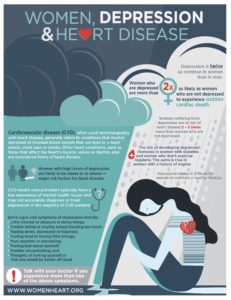When looking at people with heart disease, it’s estimated that 20 to 25 percent of all patients in a cardiac care unit are depressed at any given time — and if you also included those with symptoms of mild depression, that number goes up to around 50 percent. “Women are doubly disadvantaged,” says Dr. Sharonne Hayes. ”We’re more likely to have depression, and we’re also more likely to die of heart disease” when compared to men. See our fact sheet on Women, Depression and Heart Disease.
 Go to cardiac rehabilitation. “This is so important, because you’re accountable to someone,” says Hayes. If your doctor recommends it, go. If you’re not referred, ask.
Go to cardiac rehabilitation. “This is so important, because you’re accountable to someone,” says Hayes. If your doctor recommends it, go. If you’re not referred, ask.
Exercise. Exercising is the one thing you can be certain will lift your mood. “For people who are depressed, starting an exercise program works as well as Prozac in terms of response rates,” says Hayes.
Connect with spirituality. “I’m not necessarily talking about a religious spirituality,” says Kastan. “Just appreciate your place in the universe and where you fit. Put yourself or your circumstances into perspective.”
Manage stress and anger. Recognize what arouses your anger and avoid triggers. Look to role models to change your behavior.
Take care of yourself. Drink water, eat healthy, get enough sleep, exercise, pamper yourself somehow, and enjoy the simple pleasures in your life.
Seek help and consider counseling. “Most of us want a quick fix,” says Kastan. “We don’t want to take the time to deal with our depression — but many times, we need that extra set of ears to listen, and that extra set of hands to guide us where we need to go.”
Talk with your doctor about anti-depressants. “Not everyone needs drugs, says Hayes. “But if your doctor is recommending it and you’re resisting due to the stigma of being on medication, I would encourage you to seriously consider it. Anti-depressants can be a short-term solution, and even a six-month course can get you back to feeling even-keel. SSRIs, the most commonly prescribed anti-depressants, have been shown to have some anti-platelet activity — a good side effect for women with heart disease.
Breaking the stigma
“The goal of WomenHeart in this area is both to educate women on mental health and heart disease, and also to raise recognition of depression within the medical community. Cardiologists need to recognize the cardiac risk of poor mental health, says Hayes. “We certainly can’t be joyful all the time,” says Hayes. “But our goal is a happy heart — a content heart.”